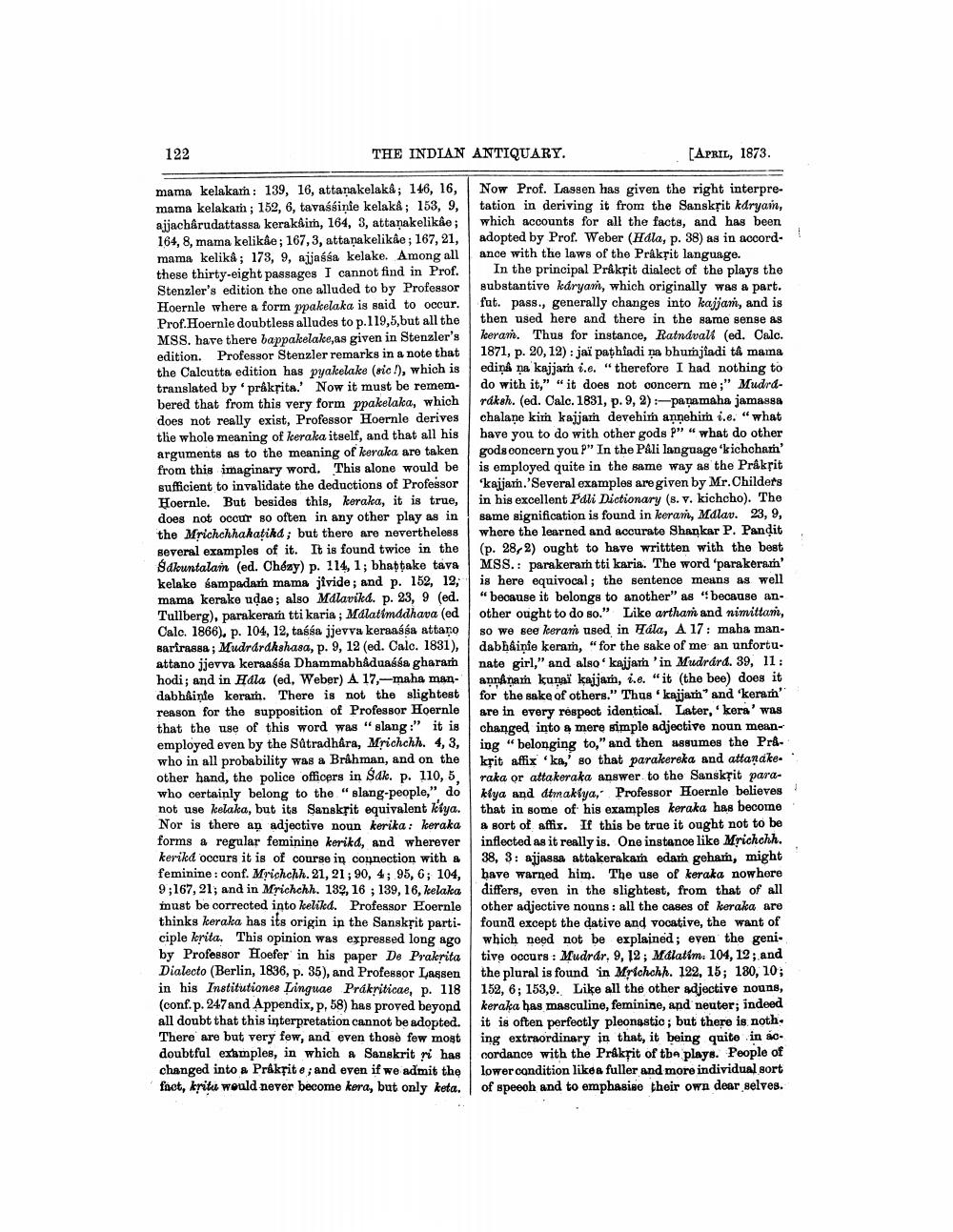________________
122
THE INDIAN ANTIQUARY.
mama kelakam: 139, 16, attaṇakelakâ; 146, 16, mama kelakam; 152, 6, tavaśśiņie kelakâ; 153, 9, ajjachârudattassa kerakâim, 164, 3, attaṇakelikâe; 164, 8, mama kelikâe; 167, 3, attaṇakelikâe; 167, 21, mama kelikâ; 173, 9, ajjassa kelake. Among all these thirty-eight passages I cannot find in Prof. Stenzler's edition the one alluded to by Professor Hoernle where a form ppakelaka is said to occur. Prof. Hoernie doubtless alludes to p.119,5,but all the MSS. have there bappakelake,as given in Stenzler's edition. Professor Stenzler remarks in a note that the Calcutta edition has pyakelake (sic!), which is translated by 'pråkrita. Now it must be remembered that from this very form ppakelaka, which does not really exist, Professor Hoernle derives the whole meaning of keraka itself, and that all his arguments as to the meaning of keraka are taken from this imaginary word. This alone would be sufficient to invalidate the deductions of Professor Hoernle. But besides this, keraka, it is true, does not occur so often in any other play as in the Mrichchhakatikd; but there are nevertheless several examples of it. It is found twice in the Sakuntalam (ed. Chézy) p. 114, 1; bhaṭṭake tava kelake sampadam mama jivide; and p. 152, 12, mama kerake uḍae; also Málavíká. p. 23, 9 (ed. Tullberg), parakeram tti karia; Málatímddhava (ed Calc. 1866), p. 104, 12, taśśa jjevva keraaśśa attano sarirassa; Mudrdrakshasa, p. 9, 12 (ed. Calc. 1831), attano jjevva keraassa Dhammabhâduaśśa gharam hodi; and in Hala (ed, Weber) A 17,-maha mandabháinte keram. There is not the slightest reason for the supposition of Professor Hoernle that the use of this word was "slang:" it is employed even by the Sutradhara, Mrichchh. 4, 3, who in all probability was a Brahman, and on the other hand, the police officers in Sak. p. 110, 5, who certainly belong to the "slang-people," do not use kelaka, but its Sanskrit equivalent kiya. Nor is there an adjective noun kerika: keraka forms a regular feminine kerikd, and wherever kerikd occurs it is of course in connection with a feminine: conf. Mrichchh. 21, 21; 90, 4; 95, 6; 104, 9;167, 21; and in Mrichchh. 132, 16; 139, 16, kelaka must be corrected into kelikd. Professor Hoernle thinks keraka has its origin in the Sanskrit participle krita. This opinion was expressed long ago by Professor Hoefer in his paper De Prakrita Dialecto (Berlin, 1836, p. 35), and Professor Lassen in his Institutiones Linguae Prákriticae, p. 118 (conf. p. 247 and Appendix, p, 58) has proved beyond all doubt that this interpretation cannot be adopted. There are but very few, and even those few most doubtful examples, in which a Sanskrit ri has changed into a Prâkrite; and even if we admit the fact, krita would never become kera, but only keta.
[APRIL, 1873.
Now Prof. Lassen has given the right interpretation in deriving it from the Sanskrit karyam, which accounts for all the facts, and has been adopted by Prof. Weber (Hála, p. 38) as in accordance with the laws of the Prakrit language.
In the principal Prakrit dialect of the plays the substantive káryam, which originally was a part. fat. pass., generally changes into kajjam, and is then used here and there in the same sense as keram. Thus for instance, Ratnávali (ed. Calc. 1871, p. 20, 12): jaï pathiadi na bhuṁjîadi tâ mama edina na kajjam i.e. "therefore I had nothing to do with it," "it does not concern me;" Mudráráksh. (ed. Calc. 1831, p. 9, 2):-paṇamaha jamassa chalane kim kajjam devehim annehimh i.e. "what have you to do with other gods P" "what do other gods concern you ?" In the Pâli language 'kichcham' is employed quite in the same way as the Prakrit 'kajjam. 'Several examples are given by Mr. Childers in his excellent Pali Dictionary (s. v. kichcho). The same signification is found in keram, Malav. 23, 9, where the learned and accurate Shankar P. Pandit (p. 28,2) ought to have writtten with the best MSS.: .: parakeram tti karia. The word 'parakeram' is here equivocal; the sentence means as well "because it belongs to another" as "because another ought to do so." Like artham and nimittam, so we see keram used in Hála, A 17: maha mandabháinie keram, "for the sake of me an unfortunate girl," and also kajjar 'in Mudrára. 39, 11: annanam kunai kajjam, i.e. "it (the bee) does it for the sake of others." Thus 'kajjam" and 'keram' are in every respect identical. Later, kera' was changed into a mere simple adjective noun meaning "belonging to," and then assumes the Prakrit affix 'ka, so that parakereka and attaṇake. raka or attakeraka answer to the Sanskrit parakiya and dimakiya, Professor Hoernle believes that in some of his examples keraka has become a sort of affix. If this be true it ought not to be inflected as it really is. One instance like Mrichchh. 38, 3: ajjassa attakerakam edam geham, might have warned him. The use of keraka nowhere differs, even in the slightest, from that of all other adjective nouns: all the cases of keraka are found except the dative and vocative, the want of which need not be explained; even the genitive occurs: Mudrár, 9, 12; Málatím: 104, 12; and the plural is found in Mrichchh. 122, 15; 180, 10; 152, 6; 153,9. Like all the other adjective nouns, keraka has masculine, feminine, and neuter; indeed it is often perfectly pleonastic; but there is noth ing extraordinary in that, it being quite in accordance with the Prakrit of the plays. People of lower condition like a fuller and more individual sort of speech and to emphasise their own dear selves.




